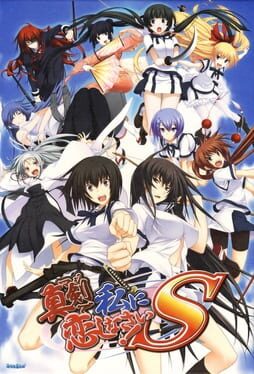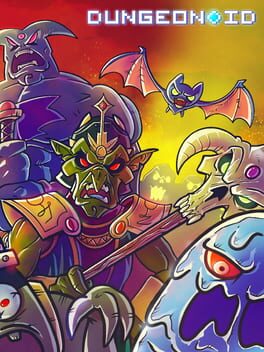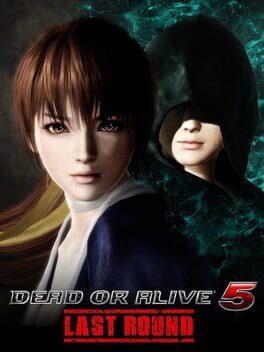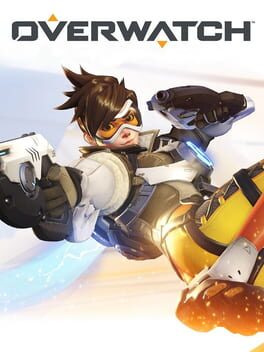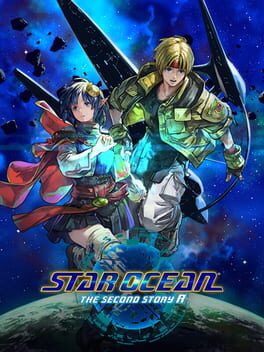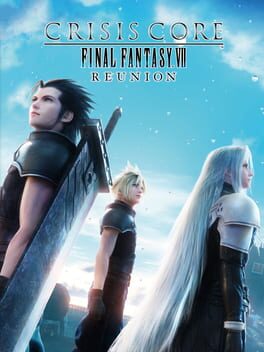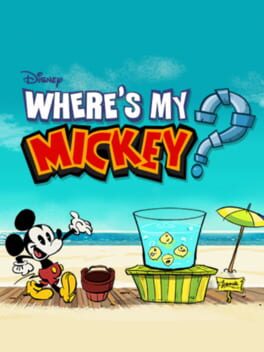heroSUSrage68
BACKER
53 reviews liked by heroSUSrage68
Generally a good sequel but also disappointing in several ways. While the narration of the action scenes still isn't up to snuff, S is far less reliant on fights in general and the ones that are there have a lot more visual flare to make them more exciting. S adds a lot of new characters and while they're all pretty fun in their own ways, only the select few who got their own routes got much time to shine. I enjoyed the new routes, particularly Kokoro's, but the routes in S typically spend too much time on H-scenes and not enough on building up an impactful story so I ended up preferring the first game. I also just generally prefer spending time with the Kazama family and they really took a backseat in this one. I appreciate them adding a route for Koyuki but making it a retcon of the past feels like a real cop-out. I realize it's a lot of complaining but the eccentric fun of Majikoi is still certainly present throughout the game so it was still a real fun time.
Dungeonoid
2020
I love Arkanoid and I love brick breaking type games when they're done well, Dungeonoid is an interesting premise with some of the worst execution I've ever seen. Giving an Arkanoid type arcade game an RPG style twist could be done well, but you won't find that here, instead you'll find awful map designs, poor power-up balances and repetitive looping music that'll have you wanting to stop playing before you even finish the first zone.
I could only stand to play the game for an hour before I quit and I never want to touch it again. I played through about 10 levels and beat the first boss and that was enough for me because after awhile it stops being about breaking blocks and more about waiting for the ball to bounce in just the right spot to hit a switch or pick up a key item. It was less like playing a game and more like waiting to play a game and when you start waiting 5 minutes at a time just for the ball to reach the exit of the stage you know there's a problem and the level design is just very poorly thought out with too many gimmicks and not enough useful power-ups for the player to balance it out.
At least getting the platinum trophy is easy and doesn't even require you to beat the game, that's really the nicest thing I can say about Dungeonoid besides the idea for the game being cool, but a cool idea does not a good game make and this is just the epitome of shovelware. I only paid $2 for it, but that's still too much, I wouldn't play this game again even if it was free and I wouldn't recommend anyone else waste even an hour of their time on it either.
I could only stand to play the game for an hour before I quit and I never want to touch it again. I played through about 10 levels and beat the first boss and that was enough for me because after awhile it stops being about breaking blocks and more about waiting for the ball to bounce in just the right spot to hit a switch or pick up a key item. It was less like playing a game and more like waiting to play a game and when you start waiting 5 minutes at a time just for the ball to reach the exit of the stage you know there's a problem and the level design is just very poorly thought out with too many gimmicks and not enough useful power-ups for the player to balance it out.
At least getting the platinum trophy is easy and doesn't even require you to beat the game, that's really the nicest thing I can say about Dungeonoid besides the idea for the game being cool, but a cool idea does not a good game make and this is just the epitome of shovelware. I only paid $2 for it, but that's still too much, I wouldn't play this game again even if it was free and I wouldn't recommend anyone else waste even an hour of their time on it either.
DOA is typically overlooked due to its huge emphasis on fan-service and ridiculous amounts of expensive DLC, but don't let that fool you because the gameplay isn't shallow in the slightest and has tons of depth with lots of complex button inputs for combos.
One of my favorite fighting games, the gameplay is just super satisfying and fun and the characters are cute too, what's not to like?
One of my favorite fighting games, the gameplay is just super satisfying and fun and the characters are cute too, what's not to like?
Overwatch
2016
The short version is, that Star Ocean: The Second Story R is a good remake of a PS1 classic that includes a lot of helpful features and tools to make this a good way to experience the game for the first time. With updated graphics that are quite appealing in the HD Pixel art era that other remakes like Live A Live have been utilizing. There are a lot of interesting ideas that are explored in Star Ocean Second Story R, and it is something other RPGs could learn from.
The long version, is that the gameplay can suffer from being incredibly unbalanced due to the way that the IC system interacts with the combat system. The IC system offers interesting ways to have characters do out of combat actions that all interact with each other in very interesting ways that then help your characters get stronger. Leveling up alchemy gets you materials to then craft into accessories and blacksmith into armor and weapons when you have enough party members with high levels of crafting. Your writing skill allows characters to write books that help other characters to learn these IC skills faster, and publish specialty books that earn you money through the game at publication houses, and cooking gives you very good healing items with effects that can improve other stats. Beyond these are many more combinations that fit into this addictive system. However, the major problem is the combat system is also reliant on this, as there were large difficulty spikes which make it so that the game seems to want you to be investing large amounts of time into leveling these stats up when the game itself is incredibly short outside of the grinding. It is fluff to expand game time when the actual amount of content as far as the main story is short even if it can be fun fluff. The issue is it not being optional by the last dungeon and being required to actually stand a chance against the final boss, let alone the upgraded and enhanced final boss.
Characters were initially interesting, but in the latter half of the game they fall off and are weaker than PS1 contemporary characters, with some of the weakest female characters I can think of from that era. Rena while being a good character, suffers heavily from being an optional protagonist who is so reliant on her other optional lead Claude who is clearly written as the main lead of the story. So much so that when large emotional moments happen for Rena, they are often ignored in favor of Claude to give him more moments even on Rena's route when Rena arguably goes through much more traumatic things than him. It is very much ripe with the feeling that Claude is the main character, and Rena is just an optional character you can play as for a second play through if you really want to. The different paths also don't feel as distinct as I would have liked, with only minor differences between each route, which usually just results in Rena getting kidnapped and trying to escape vs. Claude rescuing her. The major difference being then in the PAs, the system by which small side stories appear for characters. On paper PAs are incredibly interesting, but they fail in the end due to a few limited factors. First, they are very short, and not significant moments for characters most of the time. Secondly, they are very congested, usually getting a lot at the very moment you unlock a new character, before becoming sparse and empty until the latter half of the game, where there are again very few of them. There could definitely be more of them. Finally, they also highlight how shallow the writing is for the women characters, with all of them being either boy crazy, hysterical, or clumsy in a cutesy way to the point where there were no women characters in the party that escaped unscathed. There are two NPC women that actually do anything to the plot that are not mothers, boy crazy, or something similar, and both nearly die. It is that dire. The men for their credit usually have more fun scenes and are more enjoyable to watch PAs of.
A lot of this is cut in favor of the various different endings of the game, which come in the form of different character pairings based on which characters in your party have the highest affinity like the Fire Emblem series. However, similar to the PAs, while there are 99 different endings like the game boasts, they are too short and feel very insignificant compared to the Fire Emblem endings that usually use paragraphs of text to convey things in a better manner that feels more conclusive. Many of the ones that I had gotten feel rather disconnected from the actual central ending which is the same. It might have been that I had just gotten some poorly written ones, but that 4 of the 99 that I had gotten were so rushed, short, and inconclusive that they left me feeling kind of hollow at the end is staggering, especially as I repeat how short the central scenario of the game ended up being.
Star Ocean: The Second Story R has very interesting and fun gameplay that for the time of the original release of the game was something that made it competitive with its contemporaries despite its relatively lower level of storytelling and characters. However, in the modern day with a remake of it, it just highlights all those flaws that other games have learned from since then.
The long version, is that the gameplay can suffer from being incredibly unbalanced due to the way that the IC system interacts with the combat system. The IC system offers interesting ways to have characters do out of combat actions that all interact with each other in very interesting ways that then help your characters get stronger. Leveling up alchemy gets you materials to then craft into accessories and blacksmith into armor and weapons when you have enough party members with high levels of crafting. Your writing skill allows characters to write books that help other characters to learn these IC skills faster, and publish specialty books that earn you money through the game at publication houses, and cooking gives you very good healing items with effects that can improve other stats. Beyond these are many more combinations that fit into this addictive system. However, the major problem is the combat system is also reliant on this, as there were large difficulty spikes which make it so that the game seems to want you to be investing large amounts of time into leveling these stats up when the game itself is incredibly short outside of the grinding. It is fluff to expand game time when the actual amount of content as far as the main story is short even if it can be fun fluff. The issue is it not being optional by the last dungeon and being required to actually stand a chance against the final boss, let alone the upgraded and enhanced final boss.
Characters were initially interesting, but in the latter half of the game they fall off and are weaker than PS1 contemporary characters, with some of the weakest female characters I can think of from that era. Rena while being a good character, suffers heavily from being an optional protagonist who is so reliant on her other optional lead Claude who is clearly written as the main lead of the story. So much so that when large emotional moments happen for Rena, they are often ignored in favor of Claude to give him more moments even on Rena's route when Rena arguably goes through much more traumatic things than him. It is very much ripe with the feeling that Claude is the main character, and Rena is just an optional character you can play as for a second play through if you really want to. The different paths also don't feel as distinct as I would have liked, with only minor differences between each route, which usually just results in Rena getting kidnapped and trying to escape vs. Claude rescuing her. The major difference being then in the PAs, the system by which small side stories appear for characters. On paper PAs are incredibly interesting, but they fail in the end due to a few limited factors. First, they are very short, and not significant moments for characters most of the time. Secondly, they are very congested, usually getting a lot at the very moment you unlock a new character, before becoming sparse and empty until the latter half of the game, where there are again very few of them. There could definitely be more of them. Finally, they also highlight how shallow the writing is for the women characters, with all of them being either boy crazy, hysterical, or clumsy in a cutesy way to the point where there were no women characters in the party that escaped unscathed. There are two NPC women that actually do anything to the plot that are not mothers, boy crazy, or something similar, and both nearly die. It is that dire. The men for their credit usually have more fun scenes and are more enjoyable to watch PAs of.
A lot of this is cut in favor of the various different endings of the game, which come in the form of different character pairings based on which characters in your party have the highest affinity like the Fire Emblem series. However, similar to the PAs, while there are 99 different endings like the game boasts, they are too short and feel very insignificant compared to the Fire Emblem endings that usually use paragraphs of text to convey things in a better manner that feels more conclusive. Many of the ones that I had gotten feel rather disconnected from the actual central ending which is the same. It might have been that I had just gotten some poorly written ones, but that 4 of the 99 that I had gotten were so rushed, short, and inconclusive that they left me feeling kind of hollow at the end is staggering, especially as I repeat how short the central scenario of the game ended up being.
Star Ocean: The Second Story R has very interesting and fun gameplay that for the time of the original release of the game was something that made it competitive with its contemporaries despite its relatively lower level of storytelling and characters. However, in the modern day with a remake of it, it just highlights all those flaws that other games have learned from since then.
Alan Wake II
2023
"Show me the Champion of Light
I'll show you the Herald of Darkness"
How do you even review a game like Alan Wake II? This is a game that has been 13 years in the making. A game that many (including me) never thought we'd actually see in our lifetime. The fact it exists at all, let alone in its current state is a miracle in itself. However I ask this question for more reasons than just that. Yes, how do you even review a game like Alan Wake II because simply put there's absolutely nothing else like it in the medium of video games.
You can call Alan Wake II a postmodern detective murder mystery, an atmospheric psychological horror fever dream and a meta 4th wall shattering narrative with enough mind-bending twists, turns and revelations and layers upon layers of metaphors, meta commentary and cryptic symbolic messages to make even David Lynch, Ari Aster, Robert Eggers and Christopher Nolan proud. You can also clearly see influences and elements pulled from TV shows like Twin Peaks, True Detective and The Twilight Zone or movies like Inception, Se7ven, Hereditary, Midsommar and The VVitch, alongside games like Resident Evil and Silent Hill and even theater and rock opera, but even saying all this still doesn't do Alan Wake II justice because nothing else has ever blended all these various elements together in the same kind of way that Sam Lake and Remedy have done here and it's something you can't truly explain and just need to experience for yourself because that's what Alan Wake II is. An experience like no other.
Hell, nothing else even has the same kind of visual presentation or tells its story in the same way Alan Wake II does either. The closest thing to it would be Remedy's other hit game Control, but even then that game is so vastly different from what Alan Wake II accomplishes. We're talking in-engine graphics and cutscenes mixed with pre-rendered cutscenes mixed with tons of entirely live action sequences as well. With plenty of times when all 3 of these techniques are utilized and blended together all at once flawlessly to create a truly unique experience that only the medium of video games could ever provide.
If I could describe Alan Wake II in a single word, it would be "love" because you'd have to be blind to not see how much love went into this game at every turn while making it. The mind-blowing, revolutionary audio and visual presentation alone are proof of that, but that's far from the only thing Alan Wake II should be praised for, every single aspect of this game is mind-blowing in its own way. The budget for the game was £70 million which makes it one of the most expensive cultural products in Finnish history and it clearly shows in the sheer scope of the game and the insane and creative set-pieces, but don't let this massive budget fool you because Alan Wake II is also clearly a passion project in every sense of the word as well. A massive AAA game with the level of passion, soul and love put into it that an indie developer just starting out would put into their game.
Remedy Entertainment as a developer however aren't just starting out, no, they've been around for 20+ years and Alan Wake II is a game that truly shows this feeling like a culmination of everything Remedy have learned and done in those past 20+ years. You can clearly see elements and shades of all their previous games from Max Payne, the OG Alan Wake, Quantum Break and of course Control, but it all pales in comparison to Alan Wake II which is Sam Lake and Remedy's magnum opus and best game to date in every way possible. It's also the most Remedy game that ever Remedied and if you're a fan of the studio you'll understand what that means. Especially since this is the first Remedy game since the Remedy Connected Universe has been officially established and it has so much in-depth world-building and lore for die-hard fans who have played Remedy's other titles like Max Payne, Quantum Break and Control.
And while Alan Wake II is much more than a game, it IS still a game at its core and just like every other aspect of this experience, the gameplay is top notch as well. From the level design to the atmosphere and tension to the incredible boss fights and mind-boggling puzzles and exciting exploration which always rewards you for going off the beaten path with much needed supplies or valuable manuscript pages for extra added lore or manuscript fragments to upgrade your weapons, Alan Wake II is a master class on how to make a true blue survival horror game and feels like the closest thing we'll ever get to a modern Silent Hill 2.
Ambitious is a word that's thrown around a lot nowadays. Everyone wants to release the next game changing piece of media, but few ever do reach that level. If there's one single game that was released this year and truly deserves to be described as ambitious, it's Alan Wake II. Not only is Alan Wake II a technological marvel and the best looking game I've ever seen from a graphical standpoint, but Alan Wake II is more than a game, it's a truly one-of-a-kind multimedia EXPERIENCE that blends together cinema, literature, music and gaming all into one package in a way never before seen in this medium, but also in a way that could only ever be done in THIS medium.
Alan Wake II is simply a boundary pushing, genre defying, tour de force of creativity and innovation that would take decades of time to ever fully replicate in this same way again by anyone other than Sam Lake and Remedy and even though it took 13 years to release, the wait was more than worth it because this is the best possible version of the game we could've gotten and it was only made possible because of Remedy's own experiences making games like Quantum Break and Control leading up to Alan Wake II, which is not only a game, but an EXPERIENCE unlike any other and one that I know will stick with me for as long as I live.
I'll show you the Herald of Darkness"
How do you even review a game like Alan Wake II? This is a game that has been 13 years in the making. A game that many (including me) never thought we'd actually see in our lifetime. The fact it exists at all, let alone in its current state is a miracle in itself. However I ask this question for more reasons than just that. Yes, how do you even review a game like Alan Wake II because simply put there's absolutely nothing else like it in the medium of video games.
You can call Alan Wake II a postmodern detective murder mystery, an atmospheric psychological horror fever dream and a meta 4th wall shattering narrative with enough mind-bending twists, turns and revelations and layers upon layers of metaphors, meta commentary and cryptic symbolic messages to make even David Lynch, Ari Aster, Robert Eggers and Christopher Nolan proud. You can also clearly see influences and elements pulled from TV shows like Twin Peaks, True Detective and The Twilight Zone or movies like Inception, Se7ven, Hereditary, Midsommar and The VVitch, alongside games like Resident Evil and Silent Hill and even theater and rock opera, but even saying all this still doesn't do Alan Wake II justice because nothing else has ever blended all these various elements together in the same kind of way that Sam Lake and Remedy have done here and it's something you can't truly explain and just need to experience for yourself because that's what Alan Wake II is. An experience like no other.
Hell, nothing else even has the same kind of visual presentation or tells its story in the same way Alan Wake II does either. The closest thing to it would be Remedy's other hit game Control, but even then that game is so vastly different from what Alan Wake II accomplishes. We're talking in-engine graphics and cutscenes mixed with pre-rendered cutscenes mixed with tons of entirely live action sequences as well. With plenty of times when all 3 of these techniques are utilized and blended together all at once flawlessly to create a truly unique experience that only the medium of video games could ever provide.
If I could describe Alan Wake II in a single word, it would be "love" because you'd have to be blind to not see how much love went into this game at every turn while making it. The mind-blowing, revolutionary audio and visual presentation alone are proof of that, but that's far from the only thing Alan Wake II should be praised for, every single aspect of this game is mind-blowing in its own way. The budget for the game was £70 million which makes it one of the most expensive cultural products in Finnish history and it clearly shows in the sheer scope of the game and the insane and creative set-pieces, but don't let this massive budget fool you because Alan Wake II is also clearly a passion project in every sense of the word as well. A massive AAA game with the level of passion, soul and love put into it that an indie developer just starting out would put into their game.
Remedy Entertainment as a developer however aren't just starting out, no, they've been around for 20+ years and Alan Wake II is a game that truly shows this feeling like a culmination of everything Remedy have learned and done in those past 20+ years. You can clearly see elements and shades of all their previous games from Max Payne, the OG Alan Wake, Quantum Break and of course Control, but it all pales in comparison to Alan Wake II which is Sam Lake and Remedy's magnum opus and best game to date in every way possible. It's also the most Remedy game that ever Remedied and if you're a fan of the studio you'll understand what that means. Especially since this is the first Remedy game since the Remedy Connected Universe has been officially established and it has so much in-depth world-building and lore for die-hard fans who have played Remedy's other titles like Max Payne, Quantum Break and Control.
And while Alan Wake II is much more than a game, it IS still a game at its core and just like every other aspect of this experience, the gameplay is top notch as well. From the level design to the atmosphere and tension to the incredible boss fights and mind-boggling puzzles and exciting exploration which always rewards you for going off the beaten path with much needed supplies or valuable manuscript pages for extra added lore or manuscript fragments to upgrade your weapons, Alan Wake II is a master class on how to make a true blue survival horror game and feels like the closest thing we'll ever get to a modern Silent Hill 2.
Ambitious is a word that's thrown around a lot nowadays. Everyone wants to release the next game changing piece of media, but few ever do reach that level. If there's one single game that was released this year and truly deserves to be described as ambitious, it's Alan Wake II. Not only is Alan Wake II a technological marvel and the best looking game I've ever seen from a graphical standpoint, but Alan Wake II is more than a game, it's a truly one-of-a-kind multimedia EXPERIENCE that blends together cinema, literature, music and gaming all into one package in a way never before seen in this medium, but also in a way that could only ever be done in THIS medium.
Alan Wake II is simply a boundary pushing, genre defying, tour de force of creativity and innovation that would take decades of time to ever fully replicate in this same way again by anyone other than Sam Lake and Remedy and even though it took 13 years to release, the wait was more than worth it because this is the best possible version of the game we could've gotten and it was only made possible because of Remedy's own experiences making games like Quantum Break and Control leading up to Alan Wake II, which is not only a game, but an EXPERIENCE unlike any other and one that I know will stick with me for as long as I live.
Drakengard
2003
"My honor... my dreams...they're yours now."
Crisis Core: Final Fantasy VII serves as a prequel to the events of the original Final Fantasy VII following the story of Zack Fair a rookie SOLDIER operative with a dream of becoming a hero and tasked with the mission to find the missing SOLDIER Genesis Rhapsodos with the help of his mentor Angeal Hewley. Zack also meets many other iconic Final Fantasy VII characters along his journey like Aerith, Cloud and Sephiroth among others and it really helps to give them all even more depth and development (Especially Sephiroth) than they already had in the OG Final Fantasy VII.
Crisis Core back on the PSP was already a great game, but Reunion is without a doubt the definitive version. Not only giving massive graphical updates using assets from Final Fantasy VII Remake, but also adding major quality of life improvements to the combat making it fast and more fluid and fixing the "Digital Mind Wave" slot machine mechanic so it's nowhere near as tedious as it was in the original and even including fully voiced dialogue. However there are some aspects of Crisis Core Reunion that still feel a bit outdated and PSP-like such as the smaller scale areas and reused assets for the (tedious) side missions (There's 300 of them by the way which is a bit excessive and it's not worth doing them all IMO)
To me most of the time prequels feel unnecessary, but Crisis Core is one of those rare exceptions which only help to add more depth and detail to the world and characters of Final Fantasy VII and Reunion truly blurs the line between remake and remaster in the best way possible only enhancing an already great experience with more fluid combat, fully voice acted dialogue and massive graphical updates among other things making Reunion the definitive way to experience this iconic PSP classic.
Crisis Core: Final Fantasy VII serves as a prequel to the events of the original Final Fantasy VII following the story of Zack Fair a rookie SOLDIER operative with a dream of becoming a hero and tasked with the mission to find the missing SOLDIER Genesis Rhapsodos with the help of his mentor Angeal Hewley. Zack also meets many other iconic Final Fantasy VII characters along his journey like Aerith, Cloud and Sephiroth among others and it really helps to give them all even more depth and development (Especially Sephiroth) than they already had in the OG Final Fantasy VII.
Crisis Core back on the PSP was already a great game, but Reunion is without a doubt the definitive version. Not only giving massive graphical updates using assets from Final Fantasy VII Remake, but also adding major quality of life improvements to the combat making it fast and more fluid and fixing the "Digital Mind Wave" slot machine mechanic so it's nowhere near as tedious as it was in the original and even including fully voiced dialogue. However there are some aspects of Crisis Core Reunion that still feel a bit outdated and PSP-like such as the smaller scale areas and reused assets for the (tedious) side missions (There's 300 of them by the way which is a bit excessive and it's not worth doing them all IMO)
To me most of the time prequels feel unnecessary, but Crisis Core is one of those rare exceptions which only help to add more depth and detail to the world and characters of Final Fantasy VII and Reunion truly blurs the line between remake and remaster in the best way possible only enhancing an already great experience with more fluid combat, fully voice acted dialogue and massive graphical updates among other things making Reunion the definitive way to experience this iconic PSP classic.
Where's My Mickey?
2013
Baldur's Gate 3
2020
A masterpiece in every sense of the word, Larian have really outdone themselves with Baldur's Gate 3. Rooted firmly in DnD game systems and lore, it is a spectacular adventure from start to finish. The level of character expression through character progression/creation, dialogue choices, exploration, and combat is something that I haven't really encountered since well, Divinity Original Sin 2.
My playthrough was as a high-elf bard with a criminal background, and so as a result I ended up being a bit of a jack-of-all-trades. I could pass all persuasion/deception checks, a large pool of spells to utilize in and out of battle, and proficient with rapiers and crossbows as well. For your companions, each and every one of them has a compelling story arc (if they choose to stick around and you don't get them killed in battle). They may approve or disapprove of your actions throughout the game, but with all the variation of events there is high replay value even at ~100 hours in length.
This variation however can be hit or miss. While I have no doubt there are plenty of events I did not see throughout the game due to my choices (cool), there are some objectives that feel pretty obtuse. Either far out of the way, or requiring specific NPCs to talk to, needing to be done in a specific order, or just time sensitive. Some hidden stuff is all well and good, but some things almost feel like they require a guide to know how to do "properly". A fine line had to be walked for balancing long rests (which pass time in the world, but also restore all your character's health, spells, and trigger certain events).
Baldur's Gate 3 is a long adventure, but not a moment feels wasted. Each area is tightly designed and sprinkled with enough fast travel points and events where the player spends very little time just running around wasting time. Though the final act has its fair share of bugs, it is still a well crafted game that encompasses everything an RPG should be. The voice acting, the high-fantasy music, the atmosphere, the character and creature designs, the writing - BG3 is a treat that may just inspire me to give DnD yet another shot. In a year of plenty of tremendous video games, this is almost certainly going to be my game of the year.
My playthrough was as a high-elf bard with a criminal background, and so as a result I ended up being a bit of a jack-of-all-trades. I could pass all persuasion/deception checks, a large pool of spells to utilize in and out of battle, and proficient with rapiers and crossbows as well. For your companions, each and every one of them has a compelling story arc (if they choose to stick around and you don't get them killed in battle). They may approve or disapprove of your actions throughout the game, but with all the variation of events there is high replay value even at ~100 hours in length.
This variation however can be hit or miss. While I have no doubt there are plenty of events I did not see throughout the game due to my choices (cool), there are some objectives that feel pretty obtuse. Either far out of the way, or requiring specific NPCs to talk to, needing to be done in a specific order, or just time sensitive. Some hidden stuff is all well and good, but some things almost feel like they require a guide to know how to do "properly". A fine line had to be walked for balancing long rests (which pass time in the world, but also restore all your character's health, spells, and trigger certain events).
Baldur's Gate 3 is a long adventure, but not a moment feels wasted. Each area is tightly designed and sprinkled with enough fast travel points and events where the player spends very little time just running around wasting time. Though the final act has its fair share of bugs, it is still a well crafted game that encompasses everything an RPG should be. The voice acting, the high-fantasy music, the atmosphere, the character and creature designs, the writing - BG3 is a treat that may just inspire me to give DnD yet another shot. In a year of plenty of tremendous video games, this is almost certainly going to be my game of the year.
